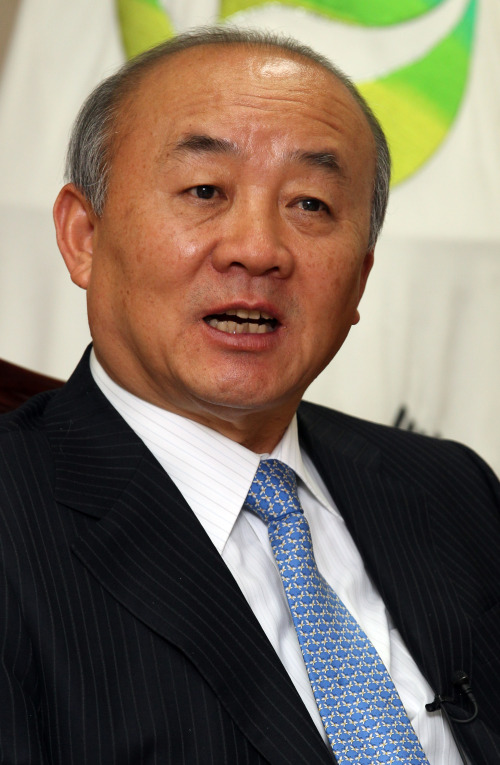North Korean leader Kim Jong-il faces challenges in handing over power to his youngest son, Seoul’s top official in charge of relations with Pyongyang said.
Kim named Jong-un vice chairman of the Central Military Commission of the ruling Workers’ Party and a four-star general last year in the clearest sign yet of his intentions to make his son the country’s next leader.
The 69-year-old leader is believed to have accelerated the succession plan since he suffered a stroke in 2008.
The plan, if realized, would mark the second hereditary power transfer in the communist country. The elder Kim inherited power from his father, the country’s founder Kim Il-sung, who died in 1994.
“I assume that the power succession is under way, though the internal and external environment is not that good,” Unification Minister Yu Woo-ik said in an interview with Yonhap News Agency in his office on Friday.
The North Korean leader is healthy enough to perform his job, Yu said. Still, he did not elaborate on the state of Kim’s health and what he meant by unfavorable conditions for succession.
His comment came as North Korea is struggling to achieve its stated goal of building a prosperous nation by next year, the centennial of the birth of the country’s late founder.
The isolated country has been under tightened U.N. sanctions over its two nuclear tests in 2006 and 2009, stymieing its efforts to revive its faltering economy.
Pyongyang has also been under pressure from South Korea, the United States and other regional powers to abandon its nuclear weapons programs in return for aid and diplomatic concessions.
Yu said the nuclear programs would not safeguard North Korea’s political system, citing former Libyan leader Moammar Gadhafi.
He said Gadhafi was killed not because he gave up the country’s nuclear programs, but because he abused his people and his country was shunned by its neighbors.
North Korea claims that it was compelled to go nuclear to cope with hostile U.S. policy and its nuclear threats.
Still, North Korea has repeatedly pressed for a quick resumption of disarmament talks without any preconditions, but Seoul and Washington insist that Pyongyang halt its uranium enrichment program and allow U.N. inspectors back into the country before resuming the talks.
The talks, which involve the two Koreas, the United States, China, Japan and Russia, were last held in Beijing in late 2008.
 |
Unification Minister Yu Woo-ik |
Yu called for patience in dealing with the recalcitrant country as he warned the North against staging a new provocation.
“At this point, there are few signs that indicate a new nuclear test or an armed provocation” will take place, Yu said. However, he cautioned that the North’s obsession with showing off its achievements next year may make it consider such options.
Last week, the North threatened to turn South Korea’s presidential office into “a sea of fire” in anger over South Korea’s massive military maneuvers near the tense sea border.
Kim and his heir apparent inspected a large combined unit near the western section of the heavily fortified border with South Korea as the North ratcheted up its threats against the South.
The elder Kim “expressed expectation and conviction that all servicepersons of the unit would boost its combat capability in every way to cope with the enemies’ provocations,” the North’s Korean Central News Agency reported late Friday.
South Korea’s show of force near Yeonpyeong Island demonstrated its commitment not to tolerate any further military provocations by North Korea.
Last year, the North torpedoed a South Korean warship and shelled the front-line island, killing a total of 50 South Koreans, mostly soldiers.
“North Korea needs to clearly recognize that provocations cannot solve its problems,” Yu said.
(Yonhap News)








![[Today’s K-pop] Blackpink’s Jennie, Lisa invited to Coachella as solo acts](http://res.heraldm.com/phpwas/restmb_idxmake.php?idx=644&simg=/content/image/2024/11/21/20241121050099_0.jpg)